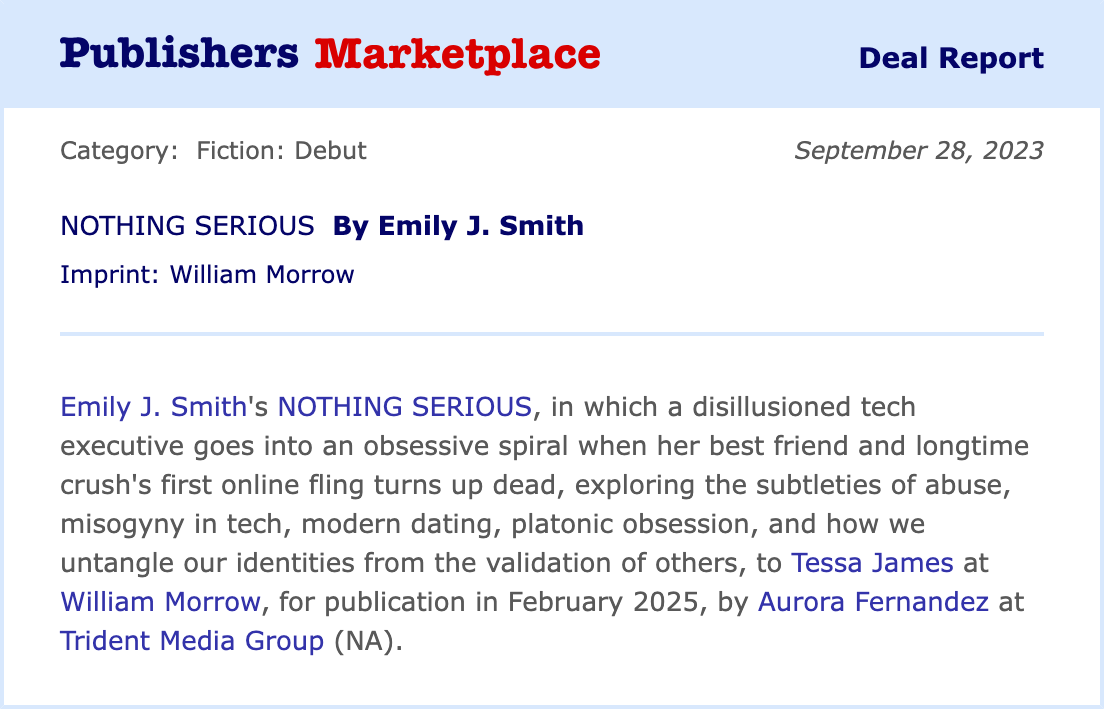Legit Awards for Indie Books
How to avoid scams and get great recognition for your writing
After self-publishing or publishing with a small press, you might be wondering what next steps you should take to gain more recognition for your brand-new book. The publishing journey doesn’t actually end with publishing, after all — at least, it doesn’t if you want to keep getting new readers for your book.
One great way to get that extra boost in sales is something often overlooked by new authors — awards. These days, just like self-publishing and small presses can be a good option for authors to get their words out there, a number of awards have popped up that are open to indie authors. And while you can easily spend hundreds of dollars paying for advertising on social media and author platforms, sometimes it might make more sense to fork over a much smaller amount and get “award-winning” added in front of your pen name.
However, there might be too many awards to choose from — how can you tell which ones are scams and which ones are actually prestigious enough that they will help your book gain the extra prominence you’re looking for?
Ask before you enter
Here are some questions to ask yourself when looking at these awards:
- Are the fees reasonable or do they give you a heart attack?
- How long has the award been around?
- What other authors have won the award (and are the winners listed on the award’s website)?
Are the fees reasonable or do they give you a heart attack?
While there are a few freebie awards that don’t charge reader fees, most do charge something, often to offset the actual costs of running the contest. However, this is where it gets a bit tricky — is the award just looking for a cash grab or is it legit?
Sometimes, it can be hard to tell. However, I’ve found a good rule of thumb has less to do with what a contest charges for their submission fees and more what you’re willing to pay and what the contest has to offer in return. If you’re on a tight marketing budget, it might make more sense to submit to 3 contests at $50 each rather than 1 contest that charges $150. However, if all 3 of those contests produce just a little bump in sales if you win, then it might be worth it to stick to the pricier, but more prestigious, award that could give you a much bigger boost in sales.
A secret weapon that might help you is a great list compiled by ALLi, the Alliance of Independent Authors. While it might not have all the contests ever created, it has a VERY comprehensive list (it’s free to use and it’s even color-coded). Check out their “Author Awards and Contests Rated and Reviewed.”
How long has the award been around?
While I’m always willing to give a new contest a try, I won’t submit blindly without a bit of research. And it’s always good to see if an award is in its 5th year or 10th year or 20th year. If a contest has hit double digits, that means there is a solid tradition being built around the award, with a stable group of judges and administrators who will keep it going year after year. A new award might appear and disappear with barely a splash — and with no lasting impact on how your book is considered or received.
This should also figure into the price tag for submission. In my book, a newer award should charge less than a more well-established award. They have less to offer authors and less of a track record. It always makes me a bit wary to see an award in its first or second year with a big reading fee attached. That, to me, indicates a cash grab and not a legitimate value for your buck.
What other authors or notables have won the award?
Sometimes, the higher price tag might be justified if it puts you into the same category as bestselling authors or celebrities. There’s a certain amount of prestige to be had if your book is in a list with the latest work of Stephen King or if you’re receiving your award at a ceremony that’s also handing out medals to Jim Carrey or Jonathan Frakes — such as the Readers’ Favorite Annual Book Award.
But if you’re going for a higher prestige award, be aware of the hidden costs, such as do you have to accept the award in person? Travel expenses might be too high of a price tag for entry, especially if you forfeit the win if you can’t go.
Also note if the prizes are in cash or in services, and if you can even use the services they offer if you’re a winner. If they’re offering you $500 of free book cover designs and you’re a graphic artist as your day job, well… probably not the best prize for you.
My personal go-to list of indie awards
This list isn’t comprehensive by any means, but these are the awards that I’ve found reputable — and worth the price tag of entry. And, yes, I’ve entered every single one of these myself (and actually won a few of them too). The reading fee for all of these awards is less than $100 each.
Free to enter (or pretty darn close)
AllAuthor Cover of the Month Contest — You CAN judge a book by its cover, at least for this contest. You simply sign up for a free account at AllAuthor.com and post your book cover (free to do so for several months a year), and get your friends, family, and fans to vote for your cover. The three book covers with the highest number of votes are the winners for that month.
First Page Challenge — As its name implies, this contest is just for the first page of your book (published or unpublished). They charge a small entry fee of $5, but winners receive a much bigger cash prize. So it’s definitely worth seeing if you can hook the judge as well as your readers with your first few words.
Indie Author Project — Organized hand-in-hand with local libraries, this award each year honors indie authors. It’s free to submit your work, with a cash prize of $1000+ for winners (depending on location).
Under $50 to enter
IAN (The Independent Author Network) Book of the Year Awards — With a low entry fee and many categories to compete in, this is a great contest for indie authors to test the waters. And how great would it be to say that your book is a “book of the year” winner?
SPR (Self-Publishing Review) Book Awards — While the basic entry fee is under $50, you can also choose to go for the higher-priced option and get reader feedback. Winners receive services to promote their books.
The Wishing Shelf Book Awards — Another award where you can either pay the basic fee to submit for the award or pay a little extra and get reader feedback. The judges are a group of readers from each category (so a children’s book will be read and judged by children in that age group). I’d highly recommend this award — they’re very responsive to authors, and you definitely feel the personal touch when they get back to you, win or lose.
Under $100 to enter
Best Indie Book Award (BIBA)— Not all awards actually give a trophy, but BIBA has a beautiful trophy to give their winners. To me, it’s worth it to have an actual trophy to put on your shelf (and the bragging rights that go with it).
The Eric Hoffer Book Award — Considered a prestigious award for small press and indie authors, there are a several awards all under the Eric Hoffer submission label, including the Montaigne Medal, da Vinci Eye, First Horizon Award, and Medal Provocateur.
Foreword INDIES Book Awards — Considered a coveted award in indie publishing, they offer an “early bird” discounted price if you submit several months before the final deadline.
Become an award-winning author!
Set aside a certain amount of cash for marketing your book, but don’t forget one key component of indie and small press publishing prestige is submitting to (and winning) awards. Awards can give you a boost in the publishing rat race, but only if you do your research and submit to those that are really legit. Make a list of the ones that are genuinely within your budget and offer you a good incentive, keep track of the deadlines to enter (most awards only accept recent publications from the past year or two), and submit, submit, submit.
Here’s wishing the best of luck to you!
Wondering how to get your book published in the first place? Check out my related article, “How I Jumped the Line & Got a Publishing Deal,” also published in The Writing Cooperative.





